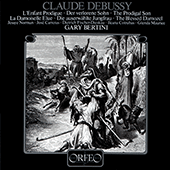Gary Bertini
Gary Bertini was born in Bessarabia (now Moldavia) in 1927. As a child he was transported to Palestine, where he started to learn the violin. After World War II he studied at the Milan Conservatory from 1946, graduating in 1948; at the Tel Aviv College of Music, graduating in 1951; and, most formatively, at the Paris Conservatoire and École Normale de Musique. In Paris he studied composition with Honegger, Messiaen, Chailley and Nadia Boulanger, as well as musicology at the Sorbonne, completing his studies in 1954. He then returned to Israel and taught conducting at the Music Teachers’ College in Tel Aviv.
In 1955 he was appointed conductor of the new Rinat Choir, which later became the Israel Chamber Choir, and made his debut as an orchestral conductor with the Israel Philharmonic Orchestra, later touring with the orchestra to America and the Far East. In 1964 he became the musical adviser to the Batsheva Dance Company, an appointment which reflected his activity as a composer for the theatre (he wrote the incidental music for over forty productions by the Israel National Theatre and the Cameri Theatre). Between 1965 and 1975 he founded and conducted the Israel Chamber Ensemble, which functioned as both an orchestra and an opera group, and with which Bertini appeared extensively throughout both Europe and the USA.
In 1965 he made his conducting debut in Britain with the English Chamber Orchestra, subsequently being invited to conduct many concerts for the BBC and with the Scottish National Orchestra, of which he was principal guest conductor between 1971 and 1981. In 1975 he was appointed professor at Tel Aviv University’s Rubin Academy, and remained very active in Israel’s musical life, serving as artistic adviser to the Israel Festival from 1976 to 1983, and leading the Jerusalem Symphony Orchestra from 1977 to 1986. Foreign posts that he held during this period included those of music adviser to the Detroit Symphony Orchestra, 1981–1983; chief conductor and intendant of the Frankfurt Opera, 1987–1990; and most importantly, chief conductor of the Cologne Radio Symphony Orchestra, 1983–1991. Maintaining his strong links with opera he was artistic director of the New Israel Opera between 1994 and 1997, and music director of the Rome Opera from 1997. The following year he was appointed music director of the Tokyo Metropolitan Symphony Orchestra, a post which he retained until his death, in Israel, in 2005. He was also active as a guest conductor with the world’s major orchestras, including the principal orchestras in Berlin, Israel, London, Milan, Munich, New York, Paris, Philadelphia, Rome, Tokyo, and Vienna.
Gary Bertini had an extensive repertoire that ranged from Josquin des Pres to contemporary composers such as Milhaud, Kagel, Ligeti, Dallapiccola, Tal and Seter. A composer himself, he was throughout his life a champion of fellow Israeli composers, and had more than twenty recordings of contemporary Israeli music to his credit. He made many recordings for a variety of labels, including CBS, RCA, Harmonia Mundi and Orfeo. His most productive collaboration was with EMI, for whom he recorded a notable cycle of the symphonies of Mahler with the Cologne Radio Symphony Orchestra during the 1980s. Other important recordings included the two symphonies of Kurt Weill, and Mahler’s completion of Weber’s opera Die drei Pintos. Gary Bertini twice received the Abbiati Prize for Best Orchestral Conductor of the Year (1995 and 1996).
© Naxos Rights International Ltd. — David Patmore (A–Z of Conductors, Naxos 8.558087–90).



















